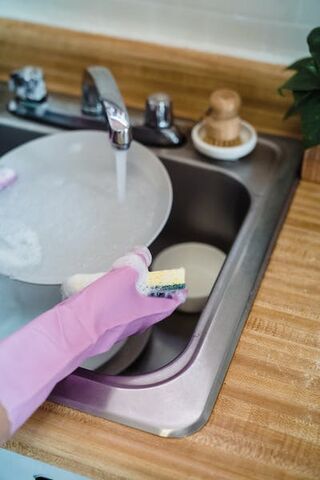Stress
8 Surprising Psychological Benefits of Routine Daily Tasks
Lower stress, reduced dementia risks, and more "me time."
Posted August 12, 2022 Reviewed by Ekua Hagan
Key points
- Brain benefits of chores include a lower risk of dementia, according to new research.
- One study found that mindful dishwashing resulted in a 27 percent decrease in nervousness for participants.
- Researchers have found that undemanding tasks give the mind a break, allowing for more creative ideas.

Cooking. Cleaning. Washing the dishes. Mowing the lawn. Making the bed. These household chores are never done; they just get repeated like a broken record. Boring! Or are they?
While many people regard chores as necessary evils, there are science-based reasons to change your attitude about chores. It turns out that doing chores is great for your health—both physical and mental—and not always in the ways that you might think.
Here’s what recent research tells us about the value of ordinary household tasks:
1. Chores can lead to creative problem-solving.
As researchers state here in a study entitled, "Inspired by Distraction: Mind Wandering Facilitates Creative Incubation," doing undemanding tasks allows the mind to wander where it will. Your mind gets a break and allows you to consider old problems with new eyes. In fact, undemanding tasks stimulated more creative ideas than demanding tasks or just resting.
2. Chores are linked to lower dementia risk.
To discover what activities might be linked to a lower rate of dementia, researchers analyzed massive amounts of healthcare data from the UK Biobank. Some 500,000 participants who had an average age of 56.5 years were followed for an average of 10.7 years.
As summarized here, the researchers found that “Those most engaged in frequent exercise, household chores, and daily visits by friends and family had a 35 percent, 21 percent, and 15 percent lower risk of dementia compared to those least engaged in these activities.” These correlations do not imply causation, but they do illustrate how simple lifestyle changes can make big differences in health, as fellow Psychology Today blogger Christopher Bergland writes.
I wondered why chores might provide a buffer against dementia that was even stronger than visits from friends and family. Maybe—I'm speculating here—it’s because chores like washing the dishes, while seemingly simple, require more planning than you might think. And chores combine physical and mental activity, both of which reduce the risk of dementia. Not to mention that as we age, the ability to do chores is one factor keeping us independent.
3. Chores are health-promoting exercise snacks.
The evocative phrase “exercise snacks” refers to small, even tiny, morsels of physical activity, such as standing for a few minutes after sitting for a while, taking a two-minute walk, or doing a chore such as sweeping up the kitchen.
Researchers have studied the effects of exercise snacks ranging from 30 seconds, like walking up a flight of stairs, to 10 minutes, like cycling on a stationary bicycle. Some of the health effects included improved memory, increased coordination, mood lift, reduced risk of atherosclerosis, diabetes, and obesity, and increased longevity.
That's quite a payout for a short investment of time and energy. A recent study found that any short amount of activity after eating, such as standing, doing chores, or (best of all) a two-minute walk, could even lower blood sugar, according to this report. (Excuse me, I'm going out for a two-minute walk right now. Be right back.)
4. Finishing your chores can increase motivation.
What is the single most important skill in behavior change? BJ Fogg, author of Tiny Habits: The Small Changes That Change Everything, asserts that the most important skill is recognizing and celebrating successes. That's why completing even a small task, like making your bed, can give you a sense of satisfaction and motivate you to tackle the next task... and the next... and the next. In the same vein, best-selling author and speaker Admiral William H. McRaven argues, "If you want to change the world, start off by making your bed." Small wins have an amazing ripple effect.
5. Chores are good for your mental health.
Completing chores increases your sense of "self-efficacy," defined briefly as a person's belief that they have the ability and skills to reach their goals.
"Self-efficacy," a concept first developed by psychologist Albert Bandura in the 1970s, has been shown to increase confidence and motivation. As discussed in more detail here, "low self-efficacy, or learned helplessness, is associated with anxiety, depression, lack of hope and lack of motivation... while higher self-efficacy is associated with life satisfaction, self-confidence, social connection, and growth mindset."
6. Chores are good for children's mental health.
Learning to do chores teaches children necessary housekeeping skills and provides "mastery experiences" that increase confidence.
To encourage children even more, psychology professor Lea Waters recommends that parents create a "success narrative" by noticing a child's small successes and acknowledging those accomplishments. In my own case (probably seen through a nostalgic rosy glow), my sister and I also learned to cooperate to get the kitchen cleaned up, and we bonded by gossiping and singing together while we did it.
7. Doing chores can reduce stress.
A small study from Florida State University explored whether the chore of dishwashing, done mindfully, could reduce stress. Using a group of 51 students, they discovered that dishwashers who were instructed to be mindful when washing dishes—focusing on the smell of the soap, the warmth of the water, and the feel of the dishes—reported a decrease in nervousness by 27 percent and an increase in mental inspiration (see #1) by 25 percent.
Although the control group didn’t experience the benefits reported above, I wonder if just finishing a necessary chore in itself relieves some stress. It's a good feeling to cross something off your to-do list or improve your living space. More research, please.
Chores that reduce clutter can also reduce stress. Various studies have indicated that clutter can be linked to higher cortisol—a stress hormone—and can also interfere with focusing. I love the title of author Gretchen Rubin's book: Outer Order, Inner Calm. That about sums it up. So if you’ve been yearning to clean out that junk drawer, do it. You’ll feel better.
8. Chores are an opportunity for “me time.”
Wanna get away? Doing repetitive chores allows you to access your inner thoughts, reflect on them, and retreat from your busy life.
Summing Up
Even chores you dislike can be made more meaningful in one simple way: Ask yourself why you are doing the chore. In this way, you can remind yourself of your basic values. For example: Maybe you take pride in a clean and well-organized house or in delicious, well-prepared food. Maybe doing chores is a way of contributing to the well-being of yourself or your family. Maybe you value the beauty of your lawn and garden and houseplants. Maybe you value the competence you feel when you complete a task successfully.
That said, it would be impossible not to resent household tasks at times. My fix? I focus on gratitude, reminding myself that I am lucky to be independent, alert, and vigorous enough to do those chores.
(c) Meg Selig, 2022. All rights reserved.
Facebook image: Stock-Asso/Shutterstock
LinkedIn image: Odua Images/Shutterstock




